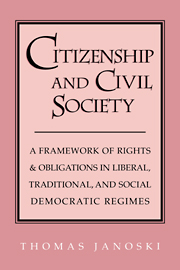 Citizenship and Civil Society
Citizenship and Civil Society Book contents
- Frontmatter
- Contents
- List of Figures and Tables
- Acknowledgments
- 1 Introduction to Citizenship
- 2 The Framing of Citizenship Rights: Expansion, Clarification, and Meaning
- 3 Reconstructing Obligations and Patriotism: Limitations, Sanctions, and Exchange in a System of Rights
- 4 Citizen-Selves in Restricted and Generalized Exchange
- 5 The Balance of Rights and Obligations through Nesting, Civil Society, and Social Closure
- 6 Incremental Change in Citizenship over Decades: Power Resources, State Structures, Ideology, and External Forces
- 7 Momentous Change in Citizenship over Centuries: From Wasps to Locomotives in the Development and Sequencing of Rights
- 8 Conclusion and Implications
- Notes
- References
- Subject Index
- Name Index
7 - Momentous Change in Citizenship over Centuries: From Wasps to Locomotives in the Development and Sequencing of Rights
Published online by Cambridge University Press: 05 June 2012
- Frontmatter
- Contents
- List of Figures and Tables
- Acknowledgments
- 1 Introduction to Citizenship
- 2 The Framing of Citizenship Rights: Expansion, Clarification, and Meaning
- 3 Reconstructing Obligations and Patriotism: Limitations, Sanctions, and Exchange in a System of Rights
- 4 Citizen-Selves in Restricted and Generalized Exchange
- 5 The Balance of Rights and Obligations through Nesting, Civil Society, and Social Closure
- 6 Incremental Change in Citizenship over Decades: Power Resources, State Structures, Ideology, and External Forces
- 7 Momentous Change in Citizenship over Centuries: From Wasps to Locomotives in the Development and Sequencing of Rights
- 8 Conclusion and Implications
- Notes
- References
- Subject Index
- Name Index
Summary
The critical factor in the emergence of citizenship is violence – that is, the overt and conscious struggle of social groups to achieve social participation. The primary instance of this violence is class conflict and we can define the main issue in class relationships about an issue about genuine participation and control. … These social movements have historically had their most significant impact under conditions of war, and warfare thus represents the second illustration of violence as the basis of citizenship.
Bryan Turner (1986a p. 26)Over the last thousand years, European states have undergone a peculiar evolution: from wasps to locomotives. … Tribute-taking states remained fierce but light in weight by comparison with their bulky successors; they stung, but they didn't suck dry. As time went on, states – even capital-intensive varieties – took on activities, powers and commitments whose very support constrained them. These locomotives ran on the rails of sustenance from civilian population and by a civilian staff. Off the rails, the warlike engines could not run at all.
Charles Tilly (1991, p. 96)The long-term development of citizenship over many centuries involves war and international conflict. This chapter formulates two comparative approaches that explain the long-term development and the ordering of citizenship rights in liberal, traditional, and social democratic regimes. The first approach attempts to explain the initial formation of each type of citizenship right.
- Type
- Chapter
- Information
- Citizenship and Civil SocietyA Framework of Rights and Obligations in Liberal, Traditional, and Social Democratic Regimes, pp. 173 - 216Publisher: Cambridge University PressPrint publication year: 1998


